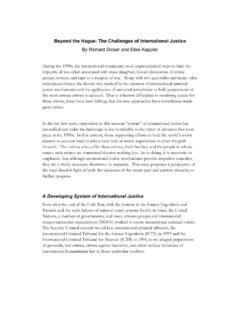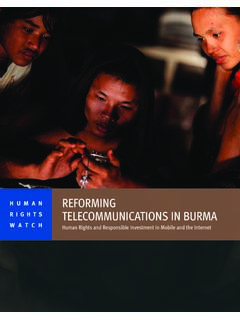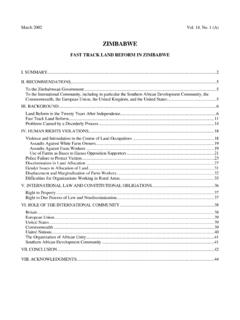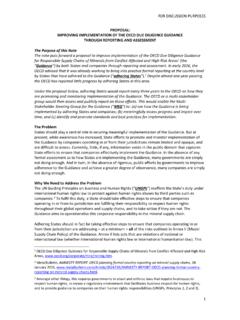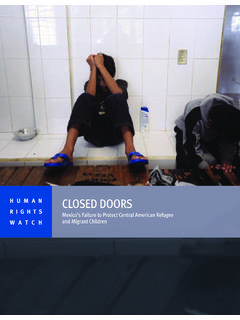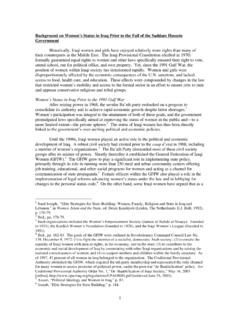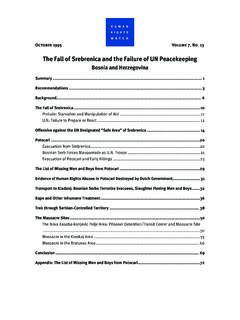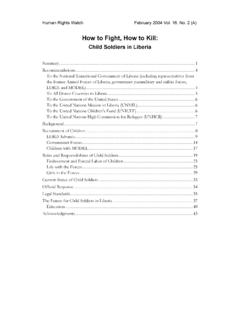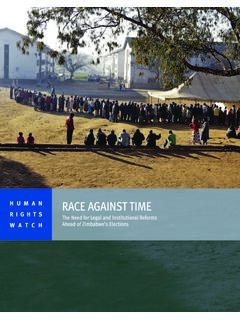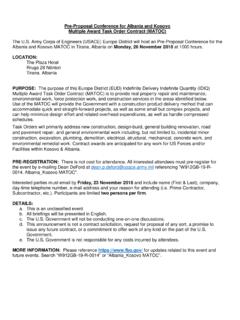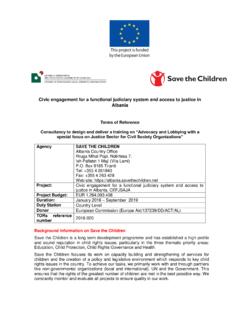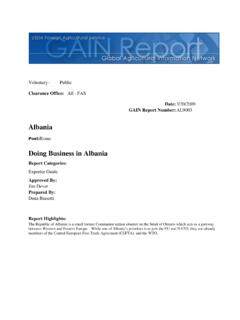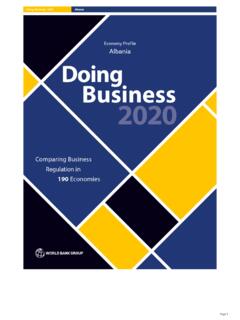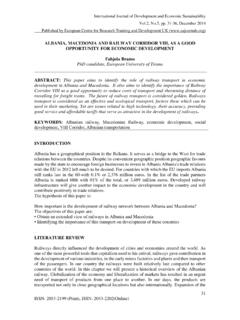Transcription of THE COST OF SPEECH: Violations of Media Freedom in Albania
1 June 2002 Vol. 14, No. 5 (D). Albania . THE COST OF speech : Violations of Media Freedom in Albania SUMMARY ..3. RECOMMENDATIONS ..6. INTIMIDATION AND VIOLENT ATTACKS ON JOURNALISTS ..11. Summary of Findings ..11. Cases of Intimidation and Violent Attacks on Fatmir The Attack on Artan The Attack and Detention of Flamur Hasbegu ..15. The Detention of Kujtim Bori Cases Related to the 2001 The Attack on the Election Cameraman ..18. The Attack on the Election The Detention of Enis Denial of access to government institutions and information ..20. Chilling Effects of Violence and Intimidation ..21. DEFAMATION Summary of Findings ..22. Overview of Legal Standards ..24. Freedom of Expression in International Law and Freedom of Expression under the Albanian Breaches in Law.
2 27. Albanian Criminal Defamation Albanian Civil Defamation Laws ..30. Breaches in Legal Practice ..31. Case of Petro Ko i v. Astrit Case of Ndre Legisi v. Artan Hoxha ..32. Case of Monika Kryemadhi v. Astrit Case of Monika Kryemadhi v. Redin Hafizi ..40. Case of Monika Kryemadhi v. Shemsi Peposhi ..42. Case of Sk nder Gjinushi v. Pandi Gjata ..44. Chilling Effects of Defamation Laws and Judicial Decisions ..46. GOVERNMENT MISUSE OF STATE ADVERTISING ..47. The Legal Framework and Its Pitfalls ..48. An Egregious Case Of Official Abuse the National Privatization Agency ..50. Discriminatory and Politically Motivated Allocation of State Advertising ..51. State Advertising as Subsidies to the Media and the Korrieri Effects of Abusive Allocation of State Advertising.
3 54. CONCLUSION ..55. APPENDIX A: CIRCULATION AND AFFILIATION OF NEWS DAILIES ..56. APPENDIX B: LETTER TO ALBANIAN MINISTRY OF APPENDIX C: LETTER TO NATIONAL PRIVATIZATION ACKNOWLEDGEMENTS ..61. Human Rights Watch 2 June 2002, Vol. 14, No. 5 (D). SUMMARY. This report looks at the situation of Media freedoms in Albania , more than a decade after the Balkan nation started a transition from totalitarianism to democracy and rule of law. Like the progress of that transition in general, respect for Media freedoms and other human rights has followed a rough path of ups and downs since 1990. While Albania has left behind the vicious suppression and isolation that marked its decades under Stalinist-style governance, the legacy of that regime continues to haunt it. The findings of this report suggest that the transition is far from over.
4 The report, which covers for the most part events of 2000 and 2001, focuses on three particular areas of concern: intimidation and violent attacks on journalists, defamation trials against the press, and political interference with the allocation of state advertising to Media outlets. The report is based on three weeks of research conducted in Albania in late 2001, primarily through interviews with Albanian journalists, editors, Media managers, Media development experts, government officials, and lawyers. The findings on defamation trials and state advertising practices are based to a large extent on documentary materials, such as judicial decisions, trial records where available, and statistical surveys. Human Rights Watch investigators found that Albanian journalists, especially those based in provinces outside the capital Tirana, are subjected to widespread intimidation and physical attacks.
5 Journalists have been targets of serious and repeated threats against them and their families, unlawful and arbitrary arrests, and severe beatings and other physical assaults. Not only journalists affiliated with opposition newspapers and televisions stations, but also reporters working for unaffiliated outlets have been so targeted. What makes such violence even more troubling is that the perpetrators are often police officers or government officials who retaliate against press criticism or reporting of official misconduct, such as alleged corruption or human rights Violations . Recently, intimidation and physical assaults against the Media reached a peak during the June 2001. election period and the subsequent run-offs. The report describes three serious incidents from that time, which suggest that the central and local authorities were responsible for widespread and possibly coordinated actions to restrict the free flow of information during the election period.
6 At all times, however, the Albanian police tend to interfere with the right of the press to cover police activities, betraying a lack of awareness about police accountability and the Media 's role as a public watchdog in a democratic society. But the police are by no means the only institution that ignores the right of the public to be informed on issues of general concern. Albania 's new Constitution and its 1999 Freedom of information law have yet to be implemented to dismantle the inherited wall of official secrecy that surrounds much of the public administration, including the judiciary. Violence against journalists goes virtually unpunished in Albania : not a single person implicated in the incidents detailed in this report is known to have been disciplined or prosecuted, despite the publicity and protests that these incidents have generated.
7 The primary responsibility to investigate such incidents and hold the perpetrators responsible rests with the Ministry of Interior and, in more serious cases, with the public prosecutorial system. Yet, both of these agencies have failed dismally to meet their responsibilities, breeding a culture of impunity that is extremely detrimental to the development of a free and vibrant press. It is imperative that the Albanian authorities establish a formal and structured process for the internal investigation of police misconduct in their relations with the Media . Similarly, the public prosecutor's offices should be instructed to investigate such allegations diligently and as a matter of priority. The Albanian Ministry of Interior did not respond to Human Rights Watch's written request for information on some of the incidents described in the report.
8 The analysis of six defamation trials in the second part of the report exposes another gap between constitutional and international guarantees of Media freedoms and respect for those freedoms, by Human Rights Watch 3 June 2002, Vol. 14, No. 5 (D). Albanian courts in particular. The observed Violations are a combined result of flawed and possibly unconstitutional defamation laws, and the ways in which the Albanian courts apply such laws. Albanian law contains criminal sanctions, up to a maximum of two years of imprisonment, for ill-defined offenses of libel and insult. Human Rights Watch maintains, as a matter of principle, that criminalization of defamation is an unnecessary and disproportionate measure that, in itself, violates Freedom of expression and press freedoms.
9 In addition, Albanian criminal defamation laws contain some particularly problematic provisions that grant special protections to state officials, such as assistance from the public prosecutorial system in proving charges of official defamation (usually against journalists). Such privileges, which private citizens do not enjoy, are wholly unjustified and inconsistent with international human rights law and jurisprudence and should therefore be repealed. International human rights law recognizes that Media freedoms are wider, not narrower, for coverage of the activities of politicians, government officials, and other public figures. Albania 's civil defamation laws, which give victims of defamation the right to seek money damages, suffer from unclear and ill-defined standards of liability, evidence, and compensation.
10 Such legal uncertainty about the limits of permissible speech can have profound chilling effects on the Media . The excessive and disproportionate damage amounts ordered by the courts in the defamation cases reviewed in this report with almost no discussion of the rights and principles at stake compound the dangers of that flawed legal framework. The failure of the Albanian judiciary to apply civil defamation laws in ways that are consistent with Media freedoms makes the need for thorough legislative reform pressing. The six defamation trials reviewed in this report were fraught with Violations of the journalist defendants' rights to a fair trial and resulted in verdicts undermining the right to free expression. One of the most serious Violations involves the principle of presumption of innocence, with the courts placing the entire burden of proof on the defendants in criminal defamation cases.
